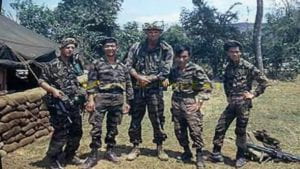Use of Spies in the Vietnam War
Learn more about: Pham Chuyen
Espionage was one of the primary methods of warfare used during the various conflicts that make up the Cold War, and the War in Vietnam was no exception. While The Sympathizer is a fictional story of a Communist Spy, there are several real world accounts of actual spies used throughout the war. This Newsweek article tells the story of Pham Chuyen, a North Vietnamese exile living in Saigon who was initially recruited by the CIA to spy on the North, but was turned into a double agent for the Communist North Vietnamese.
Learn more about: Pham Xuan An
Pham Xuan An was supposedly an American Journalist who championed the West in the media, but he had in fact been a member of the Communist Revolution for years. An used his dual status as both war reporter and spy to assist both ventures. He manipulated his own war stories and published them in Time, and used the aerial photos he took while reporting in the South as intelligence that he gave to the North. Punji Trap’s biography of the man’s double life serves as an interesting real-life look at what someone like the Narrrator of the The Sympathizer experienced while living a double life as both champion of the West and solider for the North.
Dinh Thi Van was an important figure in the North Vietnamese espionage system. She joined the Revolutionary forces in 1930, and moved to the South in the wake of the division between North and South. Once there, she established a female spy ring in the South. She funneled intelligence to the Viet Minh for years, enduring capture at the hands of the South Vietnamese Government in 1959. In 1970, she was named a “Hero of the People’s Army,” and she continued to work as an intelligence officer until the end of the war. After the war’s conclusion, she was recruited into the Defense Ministry, where she worked until her retirement.
Portrayal of the Vietnam War in American Media
The Vietnam War has become a staple in the American film industry. Over the years, many different interpretations of the war have become parts of films now considered to be landmarks in American cinema. Films such as these, while brilliant pieces of filmmaking, use the Vietnam War as as a way to promote the American point of view of the war, or in other words, portray the United States as the heroes and anyone who opposes them as the villains. In many cases, the Vietnamese are portrayed as nothing more than savages. While some films do attempt to problematize the American presence in Vietnam, they typically do so through the portrayal of Americans, rather than by offering expanded roles to the Vietnamese

Chong, Sylvia Shin Huey. “Vietnam, the Movie: Part Deux.” Pmla, vol. 133, no. 2, 2018, pp. 371–377., doi:10.1632/pmla.2018.133.2.371.
The Use of Genre and Style in The Sympathizer
The mystery genre has seen a major resurgence amongst Asian-American writers, and Viet Thanh Nguyen’s The Sympathizer is now a major addition to this resurgence. The stigma leveled against Asian-Americans during the Cold War has continued through until the modern day, and the mystery genre has allowed Asian-American authors to explore their place in American society in the wake of this paranoia and prejudice. The Narrator’s mixed race grants him a unique perspective on the prejudice he faces. While he is half-white, he does not feel he belongs among either the Vietnamese or the whites, but also grants him the ability to understand all sides of a conflict. Nguyen is able to use this unique voice to examine how those of Asian-American identity are forced to maintain balancing act between the Asian and American sides of themselves. 
Huang, Yunte. “The Lasting Lure of the Asian Mystery.” Pmla, vol. 133, no. 2, 2018, pp. 384–387., doi:10.1632/pmla.2018.133.2.384.
William Eichler ’19






